
Episodes
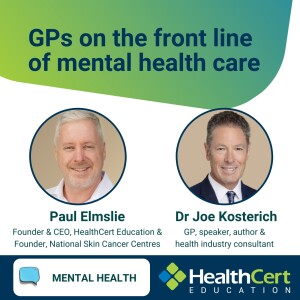
Tuesday Oct 22, 2024
GPs on the front line of mental health care
Tuesday Oct 22, 2024
Tuesday Oct 22, 2024
Did you know that more than 12 per cent of GP encounters in Australia are for mental health-related presentations?
In this episode of HealthCert’s GP Insights podcast, Paul Elmslie (CEO & Founder of HealthCert Education) talks with Dr Joe Kosterich (GP, speaker, author, media presenter, and health industry consultant with a special interest in mental health) about the role of the general practitioner at the forefront of mental health management.
In the podcast, Paul and Joe discuss:
- Common mental health conditions GPs encounter.
- The current mental health burden in Australia.
- The role of the GP in managing mental health issues in the primary care setting.
- The process for ensuring patients presenting for the first time with a mental health concern receive the right support, from initial consultation to ongoing care.
- How GPs collaborate with psychologists, psychiatrists, and other mental health professionals.
- How telehealth has impacted mental health consultations, especially post-pandemic.
- The main challenges for patients in accessing mental health care.
- The biggest challenges for GPs when dealing with mental health presentations.
- Advice for GPs who would like to pursue a special interest in mental health.
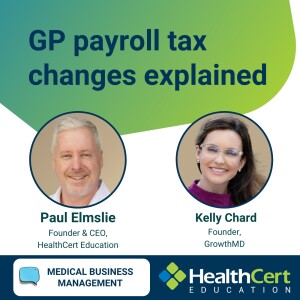
Wednesday Oct 02, 2024
GP payroll tax changes explained
Wednesday Oct 02, 2024
Wednesday Oct 02, 2024
In this episode of HealthCert’s GP Insights podcast, Paul Elmslie (CEO & Founder of HealthCert Education) talks with Kelly Chard (finance expert and founder of GrowthMD) to discuss the recent changes to payroll tax that impact medical practice owners in most Australian states.
Paul and Kelly discuss:
- What has changed in payroll tax regulations for medical practices.
- How the changes impact practice owners.
- The anticipated flow-on effects for patients.
- Proactive measures and strategies to help practice owners manage the changes and minimise the impact on their business.
- Recommended resources and guidance for practices seeking comprehensive support in navigating GP payroll tax complexities.
Hear all this and much more in the full podcast below, and join us for the next episode when we deep-dive into the new payroll tax regulations on a state-by-state basis.
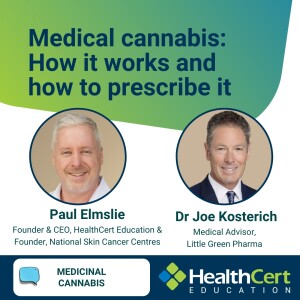
Wednesday Apr 10, 2024
Medical cannabis: How it works and how to prescribe it
Wednesday Apr 10, 2024
Wednesday Apr 10, 2024
In this episode of the HealthCert GP Insights podcast, Paul Elmslie (HealthCert Education) talks about medical cannabis with Dr Joe Kosterich – exploring common myths and misconceptions, how cannabis can be used as medicine, and how doctors in Australia can get started prescribing medical cannabis to their patients.
Paul Elmslie is the CEO and Founder of HealthCert Education. He is chatting with Dr Joe Kosterich – a GP, speaker, author, media presenter and health industry consultant who has a special interest in medical cannabis and is the Medical Advisor for Little Green Pharma.
In the podcast, Paul and Joe explore:
- Myths and misconceptions surrounding medical cannabis.
- Conditions and symptoms medical cannabis can help manage.
- Potential risks and side effects associated with medical cannabis use.
- The difference between THC and CBD.
- How to determine appropriate dosages of medical cannabis for a patient.
- Safe methods of consumption.
- What doctors need to do if they want to start prescribing medical cannabis to their patients in Australia.
- Tips and advice for practitioners who are new to this field.
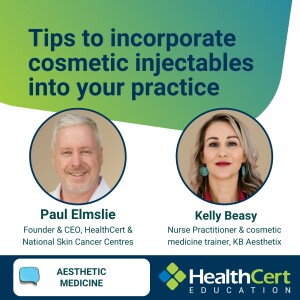
Wednesday Mar 20, 2024
Tips to incorporate cosmetic injectables into your practice
Wednesday Mar 20, 2024
Wednesday Mar 20, 2024
Tune into this new episode of HealthCert’s GP Insights podcast, in which Paul Elmslie (HealthCert Education) talks with Kelly Beasy (KB Aesthetix) about how to get started delivering cosmetic injectables, exploring Kelly's top tips for introducing the service into your practice.
Paul Elmslie is the CEO and Founder of HealthCert Education. He is chatting with Kelly Beasy - a Nurse Practitioner and cosmetic medicine trainer at KB Aesthetix with 20 years of nursing experience and 10+ years’ experience in the aesthetic industry. Learn more about KB Aesthetix.
In the podcast, Kelly and Paul explore:
- What inspired Kelly to pursue cosmetic injectables as part of her own practice.
- The essential qualifications or certifications a practitioner requires to be able to perform cosmetic injectable treatments in Australia.
- The process of getting started with cosmetic injectables.
- Kelly's top tips for practitioners interested in adding cosmetic injectables to their service offering.
- Kelly's insights into building a successful practice centred around cosmetic injectables.
- Some of the common challenges, safety issues, or risks that a practitioner might face when starting to offer cosmetic injectables in their practice.
- How the rules and regulations surrounding cosmetic injectables have recently changed in Australia, and what this means for practitioners.
- How practitioners can stay up to date with advancements in techniques or changes to regulations.
- Insights into how practitioners can manage patient expectations and ensure they have a positive experience with cosmetic injectables.
- Kelly's advice for practitioners who are new to this field.
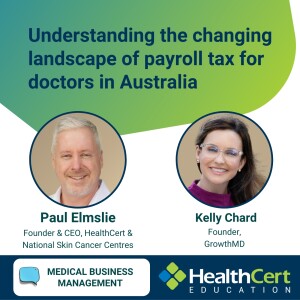
Monday Jan 15, 2024
The changing landscape of payroll tax for doctors in Australia
Monday Jan 15, 2024
Monday Jan 15, 2024
In this episode of HealthCert’s GP Insights podcast, Paul Elmslie (CEO & Founder of HealthCert Education) talks with Kelly Chard (finance expert and founder of GrowthMD) to provide the latest insights and offer valuable perspectives on the current challenges and real-life observations surrounding the changing landscape of payroll tax for doctors in Australia.
Paul and Kelly discuss:
- Some background on payroll tax, how it is calculated and who pays it.
- Why payroll tax is currently a "hot topic".
- How payroll tax is impacting general practices in Australia.
- Potential consequences if practices don’t get their affairs in order around payroll tax.
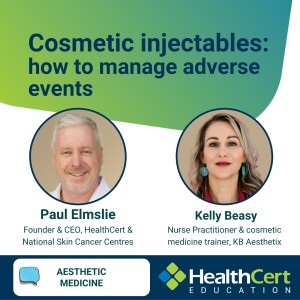
Tuesday Nov 21, 2023
Cosmetic injectables adverse events: vascular occlusion
Tuesday Nov 21, 2023
Tuesday Nov 21, 2023
In this latest podcast, Kelly Beasy (KB Aesthetix) delves into the world of cosmetic injectables and discusses adverse events of anti-wrinkle injections and dermal filler treatments, exploring the essential steps to handle these situations effectively to ensure safe and informed practices.
In this episode of HealthCert’s GP Insights podcast, Paul Elmslie (CEO & Founder of HealthCert Education) talks about cosmetic injectables adverse events with Kelly Beasy. Kelly is a Nurse Practitioner and cosmetic medicine trainer at KB Aesthetix, with 20 years of nursing experience and 10+ years’ experience in the aesthetic industry. Learn more about KB Aesthetix.
In the podcast, Kelly and Paul explore:
- Common complications that doctors may encounter with cosmetic injectables, and how they can be prevented or minimised.
- Kelly's personal experiences encountering a complication from anti-wrinkle injections and dermal fillers and how she managed it effectively.
- General guidelines and key steps for doctors to follow when facing a potential vascular occlusion or other complications.
- Potential implications for doctors from a legal perspective if a complication arises from an injectables treatment, and how physicians can safeguard themselves from legal issues.
- The importance of documentation in the management of cosmetic injectables complications, and what doctors should include in their records to safeguard themselves and their patients.
- Best practices for aftercare following anti-wrinkle injections and dermal filler treatments, and how doctors can educate their patients to ensure proper post-treatment care.
- Strategies to effectively manage patient expectations prior to administering cosmetic injectables, and how doctors can ensure patients have realistic goals for their treatments.
- How to maintain open communication and maintain your reputation to ensure patients continue to trust your expertise and return for future treatments even after the unfortunate event of a complication.
- Kelly's advice for doctors who are new to the field to minimise the risk of complications and enhance patient satisfaction and safety in their practice.
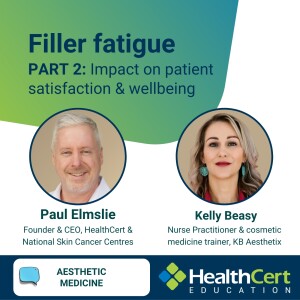
Wednesday Sep 27, 2023
Filler fatigue (part 2): Impact on patient satisfaction & wellbeing
Wednesday Sep 27, 2023
Wednesday Sep 27, 2023
In the second part of this two-part podcast series, Kelly Beasy (KB Aesthetix) discusses filler fatigue and its impact on patients' satisfaction and emotional well-being.
In this episode of HealthCert’s GP Insights podcast, Paul Elmslie (CEO & Founder of HealthCert Education) talks with Kelly Beasy about filler fatigue. Kelly is a Nurse Practitioner and cosmetic medicine trainer at KB Aesthetix, with 20 years of nursing experience and 10+ years’ experience in the aesthetic industry. Learn more about KB Aesthetix.
This podcast is the second part of a two-part series. If you missed part one, catch up here: Filler fatigue (part 1): Navigating the overfilled face
This episode focuses on the impact of filler fatigue on patients' satisfaction and emotional well-being, including the psychological aspects of aesthetic treatments; how overfilled facial features can lead to patient dissatisfaction; and techniques for managing patient expectations, providing realistic outcomes, and delivering aesthetically pleasing results that go beyond simply injecting more filler.
In the podcast, Kelly and Paul explore:
- What "filler fatigue" is and why it is important to address this concern among patients.
- Commonness of overfilling in facial aesthetics procedures and the potential consequences for patients.
- How to manage patient expectations regarding the outcomes of dermal filler treatments.
- Risks and potential complications associated with overfilling facial features.
- Techniques injectors can use to assess patients' emotional readiness for dermal filler treatments.
- Long-term effects of overfilled facial features and how to prevent them.
- Facial features/areas that are more prone to filler fatigue and how to handle these areas effectively.
- The role of facial symmetry and balance in achieving satisfactory results.
- Kelly's advice for fellow injectors to ensure patient satisfaction and emotional well-being while minimising filler fatigue.
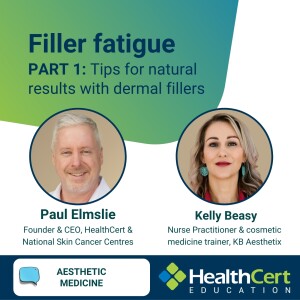
Thursday Sep 14, 2023
Filler fatigue (part 1): Navigating the overfilled face
Thursday Sep 14, 2023
Thursday Sep 14, 2023
In part one of this two-part podcast series, Kelly Beasy (KB Aesthetix) discusses filler fatigue, focusing on how to navigate the overfilled face and exploring effective strategies for correcting and preventing overfilling.
In this episode of HealthCert’s GP Insights podcast, Paul Elmslie (CEO & Founder of HealthCert Education) talks with Kelly Beasy about filler fatigue. Kelly is a Nurse Practitioner and cosmetic medicine trainer at KB Aesthetix, with 20 years of nursing experience and 10+ years’ experience in the aesthetic industry. Learn more about KB Aesthetix.
This podcast is the first part of a two-part series. This episode focuses on the causes and consequences of overfilling facial features with dermal fillers. Kelly discusses the importance of achieving natural-looking results and provides insights into identifying signs of overfilling. She also shares her expertise on corrective techniques and prevention strategies to help other doctors avoid overfilling in their own practices.
In the podcast, Kelly and Paul explore:
- The causes of overfilling when using dermal fillers in facial treatments.
- How to recognise the signs of overfilling in your patients' facial features.
- Effective corrective techniques for addressing overfilled facial features.
- Specific facial areas that are more prone to overfilling, and why.
- Potential long-term effects of overfilling with dermal fillers.
- Patient demographics and characteristics that require extra caution.
- Guidance on the appropriate amount and frequency of touch-ups to avoid overfilling.
- Techniques and injection methods that can help prevent overfilling.
- Warning signs that doctors should be aware of during and after the injection process that may indicate overfilling.
- Valuable lessons about correcting and preventing overfilling.
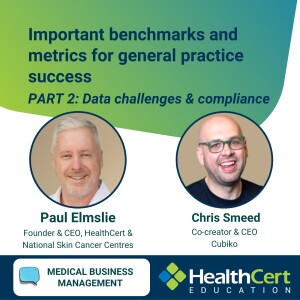
Thursday Aug 17, 2023
Important benchmarks and metrics for general practice success | Part 2
Thursday Aug 17, 2023
Thursday Aug 17, 2023
This is part two of a short podcast series on medical business management, with this part focusing on data compliance, privacy, challenges, and more.
In this episode of HealthCert’s GP Insights podcast, Paul Elmslie (CEO & Founder of HealthCert Education) talks with Chris Smeed, co-creator and CEO of Cubiko, a medical practice platform that provides insights and analysis into all practice data and helps identify areas to improve profitability and efficiency in your practice.
Missed part one? Catch up here.
In part two of this podcast series on how to identify and work towards key benchmarks and metrics for a successful general practice, Paul and Chris discuss:
- Specific challenges and barriers that general practices face when it comes to utilising data for practice improvement.
- How data can be used in a way that helps a medical practice keep track of patients and ensure they are being seen or followed up when they need to be.
- How general practitioners can leverage benchmarking data to compare their practice's performance against industry standards.
- Regulatory or compliance requirements that general practices need to consider when it comes to data collection and analysis.
- How general practitioners can ensure the privacy and security of patient data while still using it to drive practice improvements.
- Effective strategies for integrating data-driven decision-making into the day-to-day operations of a general practice.

Tuesday Aug 01, 2023
Comparing neurotoxins: the 4 anti-wrinkle injectables on the market
Tuesday Aug 01, 2023
Tuesday Aug 01, 2023
In this episode of HealthCert’s GP Insights podcast, Paul Elmslie (CEO & Founder of HealthCert Education) talks with Kelly Beasy about the different neurotoxins available in the market. Kelly is a Nurse Practitioner and cosmetic medicine trainer at KB Aesthetix, with 20 years of nursing experience and 10+ years’ experience in the aesthetic industry. Learn more about KB Aesthetix.
In the podcast, Kelly and Paul explore:
- The key differences between the four injectables products in terms of their composition and mechanism of action.
- How these anti-wrinkle injectables differ in terms of onset and duration of action.
- "Tox tips": Recommended injection techniques for achieving optimal results.
- Patient factors that may influence the choice of one anti-wrinkle injectable over another.
- Common side effects and adverse reactions associated with these injectables, and how they can be managed.
- Recommended dosing and dilution.
- Special considerations for using the four product types in combination with other aesthetic treatments and procedures.
- Different dermal filler types, including main players in the market and what product type to use for treating different areas.
- Emerging trends and advancements in the field of anti-wrinkle injectables and fillers that doctors should be aware of.
- How to approach patient consultation and assessment to determine the most suitable injectables product for their needs.
- Patient case studies using a combination of injectables and filler.
- Anatomical areas and facial features where one injectable may be more effective than the others.
- Potential future directions and areas of research in injectables.
- Kelly's tips and advice for doctors on how to enhance their skills and proficiency in using anti-wrinkle injections and dermal fillers.
